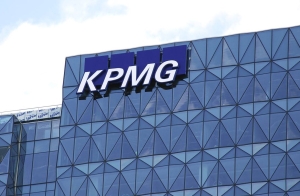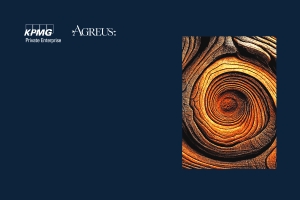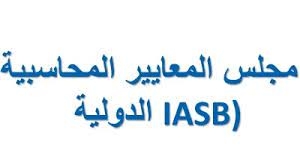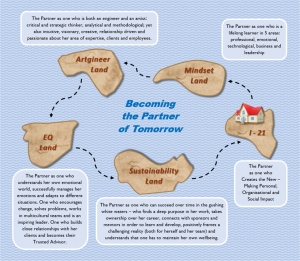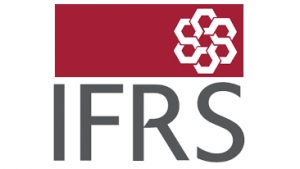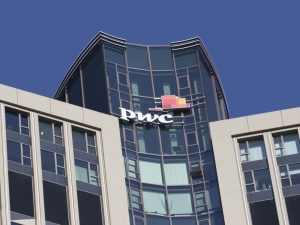عرض العناصر حسب علامة : KPMG
تطلق شركة KPMG أكاديمية ESG العالمية بالتعاون مع Microsoft
تساهم المكاتب العائلية في دولة الإمارات العربية المتحدة وهيئة الأمم المتحدة للرعاية الصحية
تستثمر المكاتب العائلية في البنية التحتية التشغيلية المتطورة وخطط تعويض الموظفين طويلة الأجل لتعزيز القدرة التنافسية.
تعلن KPMG و ServiceNow عن التزام موسع لإعادة تصور عمليات التمويل وسلسلة التوريد والمشتريات
تعد الشراكة الموسعة جزءًا من علاقة امتدت لعقد من الزمان تغطي تكنولوجيا المعلومات والموارد البشرية والمخاطر والأمن السيبراني والبيئية والاجتماعية والحوكمة (ESG)
معلومات إضافية
-
المحتوى بالإنجليزية
today announced an expanded commitment to reimagine finance, supply chain, and procurement operations. The expanded partnership is part of a decade-long relationship that spans IT, HR, risk, cybersecurity, and environmental, social and governance (ESG), includes investment from both organizations to create new offerings that bring together AI, low-code capabilities, and deep industry knowledge and expertise.
ServiceNow estimates there is a $11B total addressable market by 2025 for sourcing and procurement operations as well as a multibillion-dollar opportunity for finance and supply chain solutions that bring together people, processes, data, and technology on one, simplified platform. While early engagement is critical for procurement to be able to influence spending and enable better decision making, many internal customers are frustrated by the lack of transparency and fragmentation across the procurement and approval processes.
The joint effort combines the breadth of experience and market‑leading industry insights of KPMG professionals with ServiceNow’s recently announced AI-powered Finance and Supply Chain Workflows that complements customers' existing procurement and supply chain systems, streamlines processes, and improves the employee experience while helping reduce costs and increasing efficiency.
KPMG firms will use the new workflows to modernize their own processes and enhance the employee experience. Further, ServiceNow will leverage KPMG’s advisory expertise to optimize operations within its own finance organization.
تنضم KPMG إلى شبكة IBM Quantum Network لتعميق ريادتها الفكرية في الحوسبة الكمومية
تنضم شركات KPMG إلى شبكة IBM Quantum Network بهدف مواصلة استكشاف كيف يمكن للحوسبة الكمية أن تفتح فرصًا مستقبلية لمتخصصي وعملاء KPMG.
معلومات إضافية
-
المحتوى بالإنجليزية
KPMG firms are joining the IBM Quantum Network, aiming to further explore how quantum computing could open future opportunities for KPMG professionals and clients.
As businesses across the globe continue to navigate through an era of rapid technological transformation, the demand for progress and exploration of how quantum computing can help to develop innovative solutions has never been more critical. As a member of the IBM Quantum Network, KPMG firms intend to explore how quantum computing, as it matures, might be leveraged to help solve problems across a range of businesses and industries.
By joining the IBM Quantum Network, KPMG firms extend their long-standing relationship as a member of the IBM ecosystem and will gain access to a robust set of resources, including cloud access to IBM’s global fleet of quantum computing systems, specialized software tools, and associated expertise with the intent to advance the capabilities of KPMG professionals to help generate future technology solutions for their clients.
“IBM has a long history of innovation and advancing the reality of quantum technology and brings decades of research to quantum computing,” said Aparna Prabhakar, Vice President of Ecosystem, IBM Quantum. “KPMG now being part of the IBM Quantum Network signifies an exciting milestone in our organizations’ expanded relationship. KPMG firms' deep industry experience and commitment to delivering innovative solutions, combined with IBM's continued advances in quantum computing, present an exceptional opportunity to explore applications in quantum computing.”
KPMG تطلق برنامج ChatGPT "خاص" للعملاء
أعلنت شركة KPMG Australia أنها ستطلق KPMG KymChat، وكيل الذكاء الاصطناعي، لتزويد العملاء بوسائل ميسورة التكلفة لتسريع رحلة الذكاء الاصطناعي الخاصة بهم.
الدورة الثامنة من المنح البحثية تحت رعاية IAAER-KPMG تتيح استخدام الأبحاث في عملية وضع معايير مجلس معايير المحاسبة الدولية
أعلن مجلس معايير المحاسبة الدولية عن دعوة الرابطة الدولية للتعليم والبحث في مجال المحاسبة (IAAER) وKPMG لتلقي مقترحات بحثية لصالح برنامجهما البحثي بعنوان "إتاحة استخدام الأبحاث في عملية وضع معايير مجلس معايير المحاسبة الدولية".
30 سؤال لشركاء الغد
معلومات إضافية
-
المحتوى بالإنجليزية
30 questions for the partners of tomorrow
By Ayalla Reuven-Lelong
December 02, 2021, 11:15 a.m. EST
4 Min Read
Facebook
Twitter
LinkedIn
Email
Show more sharing options
A new era of the workplace is here, and what futurists and experts have spoken about for many years has become our new reality.
Eleven years ago, while working as external consultants for KPMG Israel, my team created the 5 Lands Journey Model to support partners and leaders in their upskilling process. The model was designed to understand how critical disruptive trends (such as technology, globalization, regulation, the new generations, talent mobility and a new socioeconomic order) are going to change the face of the workplace, creating significant challenges and opportunities for most accounting firms, partners, leaders, and employees.
In the last decade, in all our projects, we put the 5 Lands components of higher purpose, well-being, emotional self-awareness and empathy in the center of the partners' personal life and career management. We emphasized these abilities since many well-positioned and well-remunerated partners didn’t find a sense of purpose in their everyday lives, didn’t pay enough attention to their emotions and well-being, and generally felt that something was missing in their lives. As a result, many lost their passion and willingness to positively impact their teams, their clients and society at large.
Inflo Workpapers: The world’s first data-driven, AI enabled audit engagement solution
Deliver audits that are compliant, consistent, efficient and valuable. Inflo Workpapers is a transformative approach to audit documentation that combines...
SPONSOR CONTENT FROM INFLO
Today, phenomena such as the Great Resignation (which is not fully understood yet) put individuals, their needs and their purpose in the center more than ever. In the new reality we are all facing, partners and leaders can't think about their career management separately from their life management. In the past two years, most of us learned how precious time and people are in our lives and how we should not take anything for granted. Hopefully, this lesson will continue to guide many of the strategic leadership processes in the firm.
The only way to make sure that partners and leaders in any firm are future-fit and can prepare the entire workforce for the post-COVID reality is to stop separating our personal from our professional lives. This is an excellent time for partners, leaders and employees to embark on the 5 Lands Journey at a profound level and become the best version of themselves. On the one hand, they need to take good care of themselves and their well-being and find a deep sense of meaning in their everyday life. On the other hand, they need to make sure they manage their careers well — possessing enough of what we used to call the future skills, which have now become critical skills. Among those are growth mindset, creativity, critical thinking and emotional intelligence.
This unique journey needs to start with a self-reflection process. In most of our upskilling sessions today, we begin with questions based on the 5 Lands Model. These questions make leaders we work with think deeply about their personal lives, purpose and future career management.
A good suggestion might be to put the questions on cards and stop once or twice a day to pick a question and reflect upon it for a few minutes. It is also good to do it with someone you feel comfortable with or even with some team members.
Mindset Land
To what extent do you believe that with effort and investment, abilities and skills can be developed?
When was the last time you stepped out of your comfort zone? What happened?
Describe one of your failures that you did not have an easy time dealing with. In what ways do you feel it contributed to your personal growth?
What are you curious about? What do you really like to learn?
When was the last time you invested effort in developing new knowledge or skills?
Whom do you value as a successful self-made person?
What do you do, as a leader, to make sure your direct reports develop a growth mindset attitude?
Artgineer Land
When was the last time you demonstrated creativity (right side of the brain)?
How often do you stop and try to imagine your future? How would you like to see yourself two years from now?
To what extent do you perceive yourself as a person who knows how to prioritize effectively?
What is your greatest passion?
Who helps you think out loud about your personal vision and plans, in order to make them come true?
To what extent do you use your critical thinking ability?
Emotional Intelligence Land
With whom do you like to share your feelings?
How easy is it for you to "count to 10" before you react?
In what situations is it easy for you to show empathy for others? In what situations is it more challenging?
Think about a period in your life where you continued and didn’t give up, even though you had a hard time. How do you feel about this period?
What are the special abilities you value in yourself? What do you want to strengthen?
In what situations is it easy for you to demonstrate flexibility?
To what extent are you able to deal with situations of uncertainty successfully?
Sustainability Land
To what extent do you feel a sense of higher purpose in your work?
In what situations is it easy for you to look at the half-full glass, and what situations challenge you?
Who are the people in your ”social bank account” (network)? How do these relationships help you to be the best version of yourself?
What do you think you can do to build yourself a winning value proposition — both personally and professionally?
What do you do to maintain your well-being — physically, emotionally and mentally?
I-21 Land
How are you going to look when you become the best version of yourself?
What are your strengths? How do you use them?
What are your “next jumps”? How are you going to develop them?
What would you like to invest in to become the best version of yourself?
Who can help you be the best version of yourself?
What impact would you like to have on a personal and professional level?
مؤسسة IFRS تشكل مجلس معايير الاستدامة الدولية، وتدمج مؤسسة الإبلاغ عن القيمة VRF ومجلس معايير الإفصاح عن المناخ CDSB
أطلقت مؤسسة المعايير الدولية لإعداد التقارير المالية رسمياً مجلس معايير الاستدامة الدولية يوم الأربعاء الماضي وأعلنت عن خطط لتوحيد مؤسسة الإبلاغ عن القيمة -المجموعة المدمجة حديثًا التي توحد مجلس معايير محاسبة الاستدامة مع المجلس الدولي للإبلاغ المتكامل -بالإضافة إلى مجلس معايير الإفصاح عن المناخ، وهو مبادرة من مشروع الافصاح عن الكربون بحلول يونيو 2022.
معلومات إضافية
-
المحتوى بالإنجليزية
IFRS Foundation forms International Sustainability Standards Board, consolidates VRF and CDSB
By Michael Cohn
November 03, 2021, 6:45 a.m. EDT
17 Min Read
Facebook
Twitter
LinkedIn
Email
Show more sharing options
The International Financial Reporting Standards Foundation formally launched the International Sustainability Standards Board on Wednesday and announced plans to consolidate the Value Reporting Foundation — the recently merged group uniting the Sustainability Accounting Standards Board with the International Integrated Reporting Council — as well as the Climate Disclosure Standards Board, an initiative of the Carbon Disclosure Project, by June 2022.
The move to merge together the VRF, SASB, the IIRC and the CDSB within one sustainability standard-setter comes in response to demands from financial regulators at the International Organization of Securities Commissions and investors for more alignment between the sometimes competing standards and frameworks for environmental, social and governance reporting, to avoid greenwashing by companies. The formal launch was timed to coincide with the United Nations’ COP26 climate change conference in Glasgow, Scotland, where world leaders are meeting to talk about how to curb the accelerating pace of rising temperatures and natural disasters across the planet. The new International Sustainability Standards Board is expected to develop a comprehensive global baseline of high-quality sustainability disclosure standards to meet investors’ information needs.
Last year, SASB and the IIRC announced plans to merge to form the Value Reporting Foundation, with the possibility of the CDSB joining them as well. The three groups, along with the Carbon Disclosure Project and the Global Reporting Initiative, all agreed to further align their standards, but the IFRS Foundation, which also oversees the International Accounting Standards Board, soon announced its own plans to explore the creation of an International Sustainability Standards Board that it would oversee alongside the IASB (see story). Most of the other standard-setters had agreed to participate in a Technical Readiness Working Group for the proposed ISSB, but now it appears most of them will be absorbed into the new ISSB. The GRI, however, is still expected to remain independent after the ISSB is formed.
Input a lease in as little as 3 minutes with LeaseCrunch
SPONSOR CONTENT FROM LEASECRUNCH
“Sustainability, and particularly climate change, is the defining issue of our time,” said IFRS Foundation chair Erkki Liikanen in a statement. “To properly assess related opportunities and risks, investors require high-quality, transparent and globally comparable sustainability disclosures that are compatible with the financial statements. Establishing the ISSB and building on the innovation and expertise of the CDSB, the Value Reporting Foundation and others will provide the foundations to achieve this goal.”
They are also publishing prototypes of climate and general disclosure requirements developed by the Technical Readiness Working Group, a group formed by the IFRS Foundation Trustees to undertake preparatory work for the ISSB. The prototypes are the result of six months of joint work by representatives of the CDSB, the IASB, the Financial Stability Board’s Task Force on Climate-related Financial Disclosures (TCFD), the VRF and the World Economic Forum, supported by the International Organization of Securities Commissions (IOSCO) and its Technical Expert Group of securities regulators. The TRWG has consolidated some aspects of these organizations’ content into a unified set of recommendations for consideration by the ISSB.
The ISSB will sit alongside and work in close cooperation with the IASB to provide connectivity and compatibility between IFRS accounting standards and the ISSB’s standards, which will be called IFRS Sustainability Disclosure Standards. Both boards will be overseen by the IFRS Foundation trustees, who in turn will be accountable to a Monitoring Board of capital market authorities responsible for corporate reporting in their jurisdictions. The ISSB and the IASB will be independent, and their standards will complement each other to provide comprehensive information to investors and other providers of capital.
‘Development of the ISSB’s global baseline will deliver transformative change in sustainability disclosures for the financial markets,” Mary Schapiro, former chair of the Securities and Exchange Commission, and current head of the TCFD Secretariat, said in a statement. “The TCFD welcomes the formation of the ISSB, which builds upon the foundation of the globally-accepted TCFD framework and the work of an alliance of sustainability standard setters. The ISSB represents a major step forward in establishing consistent, comparable global reporting standards.”
Richard Sexton and Robert K. Steel, co-chairs of the Value Reporting Foundation Board, backed the move to consolidate their organization within the new ISSB. “Today’s announcement is a reflection of the changed world we live in — a world in which sustainability and long-term thinking are increasingly at the heart of business and investor decision-making,” they said in a joint statement. “This is a transformation that both the IIRC and SASB helped lead, made possible by the many thousands of stakeholders who volunteered time and offered resources to develop the Integrated Thinking Principles, Integrated Reporting Framework and SASB Standards that are today used by businesses and investors around the world. The Value Reporting Foundation Board believes the consolidation announced today will help deliver effective disclosures to drive global sustainability performance. We count on your continued collaboration as we embark on this exciting next step.”
CDSB chairman Richard Samans and CDP CEO Paul Simpson also issued a joint statement of support. “CDP pioneered environmental disclosure 20 years ago and has hosted CDSB since its formation in 2007,” they stated. “CDSB’s global partnership of business and environmental organizations supported by the international accounting community was formed to create a generally-accepted framework for corporate reporting of material climate, environmental and social information to investors and regulators.”
The ISSB plans to develop IFRS Sustainability Disclosure Standards, including disclosure requirements to address companies’ impacts on sustainability matters relevant to assessing enterprise value and making investment decisions. The ISSB standards will be developed to facilitate compatibility with requirements that are jurisdiction specific or aimed at a wider group of stakeholders (such as the European Union’s planned Corporate Sustainability Reporting Directive as well as initiatives in the Americas and Asia-Oceania).
The G20 Finance Ministers and Central Bank Governors and the Financial Stability Board both welcomed the IFRS Foundation’s work program to develop global baseline standards for sustainability disclosures.
The IFRS Foundation reached commitments with the CDSB, whose secretariat is hosted by CDP, and the VRF to consolidate their technical expertise, content, staff and other resources with the IFRS Foundation. The technical standards and frameworks of the CDSB and the VRF, along with those of the TCFD and the Forum Stakeholder Capitalism Metrics, will provide a basis for the technical work of the new board.
“We become part of the IFRS Foundation,” said Neil Stewart, director of corporate outreach at the Value Reporting Foundation. “We become the foundation of the ISSB. What’s really great is that this is not just a matter of us handing over our standards and riding off into the sunset. This is really consolidating our people, our relationships, our IP. We’re bringing over a decade of work, of partners, of all those networks and relationships that have gone into the creation of the SASB standards and the integrated reporting framework. We’re bringing that into the ISSB. Don’t just look at this as a set of standards and a framework that they pick up and run with. It’s a whole ecosystem that now is kind of like a chrysalis coming out and hatching into the ISSB.”
Recognizing the urgency and the desire to provide the ISSB with a solid foundation on which to start its work, the trustees created the TRWG, which includes representatives from the CDSB, TCFD, IASB, VRF and the World Economic Forum, to provide recommendations to the ISSB. The TRWG has concluded its work on two prototype documents that were published Wednesday, one focusing on climate-related disclosures that build on the TCFD’s recommendations, and include industry-specific disclosures, and a second setting out general sustainability disclosures. The intention is for the ISSB to consider the prototypes as part of its initial work program.
The ISSB will also draw upon expertise from several advisory groups. Technical advice on sustainability matters will be provided to the ISSB by a new Sustainability Consultative Committee, whose members will include the International Monetary Fund, the Organization for Economic Cooperation and Development, the United Nations, the World Bank and other experts drawn from public, private and nongovernmental organizations.
The remit and expertise of the IFRS Advisory Council will be extended to provide strategic sustainability-related advice and counsel to the ISSB, as well as the IFRS Foundation trustees and the IASB. Finally, the trustees have formed a working group to create a mechanism for formal engagement on standard-setting between the ISSB and jurisdictional representatives, including from emerging markets (similar to the Accounting Standards Advisory Forum, which plays this role for the IASB).
The IFRS Foundation said it intends to leverage the existing CDSB and VRF advisory groups, which include investors and other experts who have demonstrated long-standing support for improved sustainability disclosure. In addition, the World Economic Forum’s private sector coalition will be engaged. The IFRS Foundation intends to use the International Integrated Reporting Council to give it advice on establishing connectivity between the work of the IASB and the ISSB through the fundamental concepts and guiding principles of integrated reporting.
The ISSB will have a global and multi-location presence. All regions of the world — the Americas, Asia-Oceania and EMEA (Europe, the Middle-East and Africa) — will be covered. Engagement with developing and emerging economies will also be a big priority.
The IRS Foundation Trustees are currently in advanced stages in appointing a chair and vice-chair(s) to the ISSB. They have also begun to search for additional board members up to the full complement of 14 members .
The ISSB’s work is expected to begin as soon as the chair and vice-chairs have been appointed and to begin with public consultations to inform the ISSB’s work plan and on proposals informed by recommendations from the TRWG. Following these consultations, the ISSB’s work will follow the IFRS Foundation’s due process, including public discussions by the ISSB of feedback received in response to consultations and possible improvements to the proposals prior to their finalization as standards. The entire process will be overseen by the IFRS Foundation trustees’ Due Process Oversight Committee.
It’s unclear what will happen to the ongoing work of the Value Reporting Foundation and its SASB Standards Board, as well as the new board members that the VRF named only last week, but Stewart said they would continue to meet and work on their new standards until the merger closes next June. The VRF and SASB Standards Board had been working on other initiatives besides climate change issues, in the areas of human capital, diversity, mining industry tailings management, internet content moderation and other projects.
“It’s important for us not to preempt the work of the ISSB,” said Stewart. “The chair, vice chair and board members haven’t been named. The very first thing that has to happen is for the ISSB to go out on a public consultation, not only on the climate disclosure standard, which should be the first order of business because of the urgency of climate change, they will be consulting too on what will be their priority issues. The ISSB will need to follow a very rigorous due process, which the IFRS Foundation is uniquely positioned to steer because of their history with the IASB. I would never say that here is the ISSB’s research agenda and it includes all of these research projects because it doesn’t exist yet. They have to do that public rigorous process, but those projects won’t stop in their tracks tomorrow. The SASB standards will continue to be maintained and used in the near future and the near and median term as the ISSB gets set up and they go through the initial process with the climate disclosure standard and get up and running. The merger won’t close for another eight months, and in the meantime everything keeps running.”
Reactions
Another ESG standard-setter, the Global Reporting Initiative, has not announced plans to become part of the ISSB, but expressed its readiness to engage with the group.
“GRI is pleased that the IFRS Foundation has recognized the merits of incorporating sustainability considerations into financial disclosures, through the creation of a sustainability standards board,” said GRI interim CEO Eric Hespenheide in a statement. “We also welcome that the reporting organizations with a core focus on investors needs are to come together under one house. We advocate for a comprehensive corporate reporting system, with a two-pillar structure in which robust sustainability and financial reporting are on an equal footing. The sustainability pillar, under which GRI sits, addresses a company’s external impacts on society and the environment, while the financial pillar needs to reflect sustainability risks to a company’s value. Today’s announcement marks a significant step toward strengthening that second pillar. Disclosure on a company’s financially material sustainability topics — while important from the context of helping markets to assess opportunities and risks — is not sufficient to deliver full transparency on sustainability impacts, as envisioned by the GRI standards and embraced by the EU. Corporate transparency that meets the needs of all stakeholders requires improved connectivity between sustainability and financial reporting. I therefore reiterate once again that GRI stands ready to engage with the IFRS Foundation in support of this aim. We look forward to hearing more about the remit and scope of their new ventures, as well as inputting to the development of the proposed climate standard.”
KPMG welcomed the new group. “Today’s announcement by the IFRS Foundation is a watershed moment for sustainability disclosure standards and an important step that will help harness our capital markets to secure a sustainable future,” said KPMG global chairman and CEO Bill Thomas in a statement. “You can’t change what you can’t measure, and the creation of globally consistent and transparent sustainability disclosure standards will strengthen our capital markets by helping investors and business leaders make better decisions and refocus their dynamism on long-term value creation. We all need to recognize that we have a role to play in helping solve society’s biggest challenges. The IFRS Foundation is a key ally and I am proud that KPMG has supported them on this important initiative, including through our work on Stakeholder Capitalism Metrics with the World Economic Forum.”
The Association of Chartered Certified Accountants also expressed its support. “This development means we now have a once in a lifetime opportunity to help shape global reporting standards for the benefit of investors, economies and the public good,” said Helen Brand, chief executive of ACCA and co vice-chair of the Value Reporting Foundation board, in a statement. “In December 2020, we expressed strong support for the creation of the ISSB. This is needed to address the scale of global environmental and social challenges today, accelerate the necessary reallocation of capital, and drive positive changes in corporate decision-making. With the global reach of the International Integrated Reporting Framework and the SASB Standards, the VRF can help the ISSB to achieve much-needed consistency in reporting across the world. The IFRS Foundation’s commitment to build connectivity between financial and sustainability reporting using the principles of integrated reporting is particularly welcome. We believe that this is vital to high-quality connected corporate reporting.’
ACCA also published Wednesday a policy paper, Principles for connected corporate reporting standard setting, which calls for a consistent and connected set of global reporting standards and aligns with much of what the ISSB and the VRF will be doing.
The International Federation of Accountants, which had called last year for the creation of the ISSB along with the International Organization of Securities Commissions, also pledged its support. IFAC also welcomed the commitments to combine the CDSB and Value Reporting Foundation with the IFRS Foundation to provide much needed consolidation and contributing support and resources toward the success of the new ISSB.
“Now is the time for policymakers around the world to focus on how to capitalize on the forthcoming work of the ISSB,” said IFAC CEO Kevin Dancey in a statement. “As with the success of IFRS Standards for financial reporting, IOSCO’s support is key. Jurisdictions around the world need to take the next step—deciding to use, implement, and enforce IFRS Sustainability Disclosure Standards as part of a Building Blocks Approach that will deliver the global baseline for sustainability-related reporting needed for investors and capital markets.”
The International Public Sector Accounting Standards Board also praised the formation of the ISSB. “Climate change is an issue that is increasingly important to us all,” said IPSASB chair Ian Carruthers in a statement. “Urgent public sector action will be critical to successfully addressing climate change, through the combination of its central roles as policy setter, regulator, funder and in service delivery. Strong governance, effective implementation, and accountability for the use of public sector resources will all be essential if governments are to play their parts in addressing climate change and sustainability more broadly.”
KPMG's U.S. firm also offered its support for ISSB. “Today’s announcement by the IFRS Foundation advances the march toward ESG engagement on a more global scale,” said KPMG audit vice chair Scott Flynn in a statement. “At KPMG, we support the development of a baseline global ESG reporting standard to reduce complexity and achieve greater relevance, consistency, reliability, and comparability in ESG reporting. This announcement serves the capital markets by helping investors achieve their ESG goals that will power global solutions to societal challenges. It also underscores the need for companies to prepare now. Embedding ESG engagement throughout one’s organization and transformation requires scenario planning, materiality assessments, strategy, operations, assurance, and more. It demands an all-hands mentality to meet this all-hands moment.”
“At KPMG, we believe ESG engagement makes business better,” said KPMG Impact leader Rob Fisher in a statement. “The announcement today by the IFRS Foundation is a big step forward in the development of a baseline global ESG reporting standard that can accelerate the financing of private-sector solutions to society’s most pressing problems. It will also help many companies seeking to go from ‘why’ to ‘how’ when it comes to ESG engagement by reducing complexity in reporting and helping them tell their ESG story to investors. Deep engagement on strategy, operations, and reporting has the potential to create a virtuous circle or ‘flywheel effect,’ powering transformation that drives measurable profitability and sustainability today and tomorrow. Today’s announcement has flywheels spinning faster.”
The Center for Audit Quality also applauded the move.
“Investors are clear that climate and other ESG-related disclosures are integral to their investment decisions,” said CAQ CEO Julie Bell Lindsay in a statement. “Today’s ISSB announcement is a positive step forward to providing a global baseline to deliver consistent and comparable sustainability standards.”
The Institute of Management Accountants also released a statement of support for the ISSB. “As described, this ISSB will work in close cooperation with the International Accounting Standards Board under the Foundation’s governance structure,” said the group. “IMA is also pleased to observe the commitments to combine the Value Reporting Foundation and the Climate Disclosures Standards Board into the foundation of the ISSB. This week, with the endorsement of its Sustainable Business Management Global Task Force, IMA released its Statement of Position on Sustainable Business Information and Management and observes that the IFRS Foundation’s measure aligns with several of the articulated principles such as reducing fragmentation in ESG reporting, reflecting existing precedent around materiality with respect to investors and the securities markets, and focusing holistically on value creation. It also signals alignment with our principles related to supporting small and medium sized enterprises, internal controls, and the use of technology, particularly digital reporting. Management is a critical information user and stakeholder, and we encourage additional steps to ensure that the new accounting paradigm promotes trust, builds value and facilitates action.” - البلد عالمي
5 استراتيجيات لتحسين دائرة الضرائب
حتى قبل COVID-19، كانت القوى الاقتصادية والتنظيمية والاجتماعية غير المسبوقة -بما في ذلك اللوائح التجارية العالمية المعقدة، والتقدم في معايير المحاسبة وتطورات قانون الضرائب العالمي -تدفع الشركات إلى إعادة التفكير في كيفية قيامها بأعمالها. لقد جعل الوباء العالمي الحاجة أكثر إلحاحًا، مما أدى إلى تفاقم التحديات التي تواجه العديد من فرق الضرائب. تقلصت الميزانيات، وتواجه الشركات الآن تغييرات محتملة في معدلات ضرائبها في ظل إدارة جديدة.
برايس ووترهاوس كوبرز تضيف 100 ألف وظيفة!
تستثمر شركة برايس ووترهاوس كوبرز 12 مليار دولار عبر أعمالها العالمية في إصلاح شامل يستهدف عمليات تدقيق أفضل
معلومات إضافية
-
المحتوى بالإنجليزية
PwC to add 100K jobs in $12B strategic revamp
PricewaterhouseCoopers LLP is investing $12 billion across its global business in an overhaul targeting better audits, digitization of services and greener operations.
The professional-services provider will hire 100,000 employees and develop the skills of existing staff over the next five years as it seeks to respond to the post-pandemic operating environment, it said in an emailed statement on Tuesday.
“We will continue to evolve our ways of working, and expand our capabilities in the areas that matter most for the future, while remaining steadfast in our commitment to quality,” PwC Chairman Bob Moritz said. “We want our people to be the most sought after in the market.”
Auditors are grappling with managing quality amid a shift in ways of working introduced by the COVID-19 pandemic. The International Auditing and Assurance Standards Board has revised standards for auditors, coming into effect in 2022, to boost technology use, help manage new risks, and improve quality management.
PwC is also seeking ways to address growing calls for transparency in the profession from stakeholders after several accounting scandals among the Big Four auditing firms knocked public trust. In South Africa, for example, KPMG has put in place a variety of reforms after it came under fire in 2017 for work done for a politically connected family accused of plundering the government’s coffers.
The South African unit of PwC will add at least 2,500 new employees over the next five years, Chief Executive Officer in the region Dion Shango told reporters in a conference call. Across Africa, where it has a presence in 34 countries, the firm plans to bulk up its operations with a $400 million investment. The company is also interviewing for non-executive directors to strengthen audit oversight.
PwC has also set aside $3 billion of its total global investment to help double the scale of its Asia-Pacific operations, it said. The firm’s spending will also focus on responding to environmental, social and governance trends across its operations.

